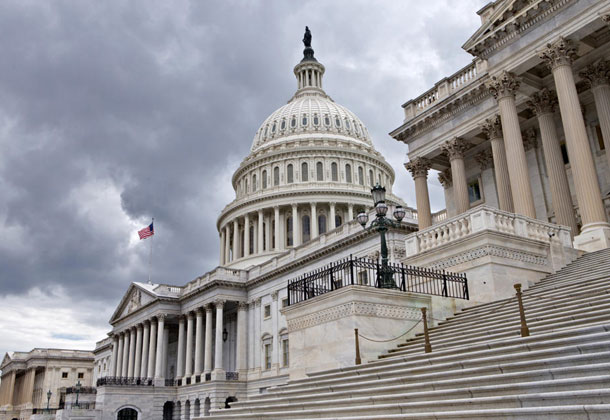House Republicans working on averting another shutdown
February 6, 2018 | 7:20am

This photo taken July 23, 2013, show the US Capitol in Washington. (AP Photo/J. Scott Applewhite)
WASHINGTON — House Republican leaders are grappling for a strategy to avert another US government shutdown at midnight Thursday.
They scheduled a closed-door session Monday evening to brief House GOP lawmakers on a way to pass a stopgap funding bill that could last through March 23 to buy time for progress in implementing any follow-up budget pact and, perhaps, pass immigration legislation.
One option, GOP aides said, would be to pass the stopgap spending bill by marrying it with a full-year, $659 billion Pentagon spending bill. The aides required anonymity because lawmakers hadn't been briefed.
Republicans are scrambling to pass the measure through the House since they can't count on support from Democrats — who feel stymied by inaction on legislation to protect young immigrants from deportation — to advance the legislation.
That approach of pairing the Pentagon's budget with only temporary money for the rest of the government wouldn't go anywhere in the Senate, vowed Minority Leader Chuck Schumer, D-N.Y., who said it "would be barreling head first into a dead-end."
On the other hand, the Senate might respond with a long-awaited spending pact to give whopping increases both to the Pentagon and domestic programs. Talks in the Senate on such a framework appeared to intensify in hopes of an agreement this week, aides and lawmakers said.
The situation in both the House and Senate was murky, though it's clear Senate Democrats have no appetite for sparking another government shutdown.
The broader budget picture is one in which GOP defense hawks are prevailing over the party's depleted ranks of deficit hawks while Democrats leverage their influence to increase spending for domestic priorities such as combating opioid misuse.
The result could be the return of trillion-dollar deficits for the first time since former President Barack Obama's first term.
Details are closely held and subject to change. But at issue is a two-year deal to increase caps on spending set by a failed 2011 budget deal. Republicans have pushed for defense increases in the neighborhood of $80 billion a year and have offered Democrats nearly as much — $60 billion or so per year — for nondefense programs.
Add in $80 billion to $90 billion worth of hurricane aid for Texas, Florida and Puerto Rico, health care funding and money for President Donald Trump's border security plan, and the final tally could total close to $400 billion. The potential cost, over the 2018-19 budget years, would rival the deficit impact of last year's tax measure over that period.
"Republicans for years have made all of these bold promises to rein in spending," said Brian Riedl, a budget analyst at the conservative Manhattan Institute. "And they're doing the opposite."
The potential agreement would significantly exceed Trump's request for a $54 billion increase in defense spending — to $603 billion before adding war funds — above the current cap. Rep. Mac Thornberry, R-Texas, said negotiators are "very close to a budget agreement."
Meantime lawmakers are struggling to sort through a solution to protect younger immigrants soon to be at risk of deportation with Trump's elimination of the Deferred Action for Childhood Arrivals program, established by Obama. House Minority Leader Nancy Pelosi, D-Calif., has linked progress on the budget with action to address the program but other Democrats are beginning to agitate for delinking the two, lest the opportunity for a budget pact be lost.
After last year's tax bill, the Congressional Budget Office says the deficit for 2018 will hit about $700 billion — before any fresh increase. Next year's deficit is already estimated to reach $975 billion, so the brewing agreement would mean the first $1 trillion-plus deficit since Obama's first term.
BrandSpace Articles
<
>
Philstar
- Latest
- Trending
Trending
Latest
Trending
Latest
Recommended






























